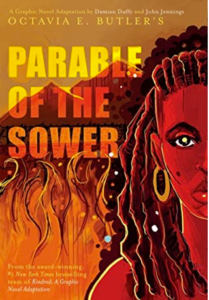I actually hadn’t read the original text of Parable Of The Sower before this, but I have read and loved Parable Of The Talents. I’ve also read and, in retrospect, disliked Kindred — I had good things to say about it at the time, but the way Sarah treated her ancestress feels more selfish and less forgivable with time.
 PotS will not leave a similar impression on me, thankfully, but it will also not reach the heights of PotT in my esteem. A large part of why is gently pointed out by Nalo Hopkinson in her outstanding introduction: the Lauren Olamina here is a teenager and thinks she knows it all and is impatient with the older people who seem, to her, to be stuck in their ways. She lives in the walled enclave of Robledo with her preacher dad, her teacher stepmom, her brother and half-siblings. Life in Robledo is hard but much better than the squalor outside their walls. At least inside the enclave, they have enough food and shelter for everyone.
PotS will not leave a similar impression on me, thankfully, but it will also not reach the heights of PotT in my esteem. A large part of why is gently pointed out by Nalo Hopkinson in her outstanding introduction: the Lauren Olamina here is a teenager and thinks she knows it all and is impatient with the older people who seem, to her, to be stuck in their ways. She lives in the walled enclave of Robledo with her preacher dad, her teacher stepmom, her brother and half-siblings. Life in Robledo is hard but much better than the squalor outside their walls. At least inside the enclave, they have enough food and shelter for everyone.
Lauren still doesn’t feel safe there, tho, and is constantly dreaming about traveling north to where, she’s heard, there are greater opportunities and less incivility. She also dreams of forming a new religion with a god vastly different from her Baptist father’s. She doesn’t dare tell anyone about her dreams or preparations for fear of scolding or worse, but when disaster strikes and her proto-prepper precautions turn out to have been prescient, she must set off on her path much earlier than expected.
The way north to safety is hard and with few allies, but Lauren slowly gathers the beginning of Earthseed, as she calls her religion and the community around it. But will the promised land prove nothing but false, and her journey through hardship, evil and literal fire be all for naught?
Having read PotT first, I knew what the answer would be, but it was still nice to have the blanks filled in for me. That said, I can see why I was in no rush to read this book despite loving its sequel, and not just because loving a sequel that I read before the first in the series has rarely led to happy results for me. The largest part of the problem is that reading PotS in 2021, a mere three years before the events of the book are supposed to take place, makes a good portion of the story feel hysterical, in similar fashion to how anyone reading 1984 towards the end of the 20th century might feel. There are certainly parts that resonate (e.g. the uselessness of police, the untamable California wildfires, the basic premise of Earthseed) and parts that feel prescient (especially the creeping power of corporations to enslave) but there’s just too much that feels like fearmongering. I know my views on this are influenced in large part by the reality of the current political climate: guns are far more likely to kill the innocent than to protect them in early 21st century America, and uggggggh, the whole “fuck this planet, let’s go to the stars!” is the kind of irritating, impractical bullshit currently being spouted by some of the most terrible people. While I can see where those positions on guns and space flight were far more reasonable to hold back when this book was published in… wait, wtf, 1993? It certainly feels far more 1970s-80s! But, I suppose, this was pre-Columbine, pre-billionaires racing to colonize space. And hey, not all sci-fi prophecies pan out in the practicalities, so Octavia E Butler is in good company there!
Speaking of good company, Damian Duffy does a really good job of adapting the book and concepts to graphic novel format. It certainly felt extremely weighty for a comic book. John Jennings’ illustrations are excellent, particularly in the colors and in the varying pressures of the line work, bringing to mind linocut prints that add a greater artistic dimension to the product as a whole. There were panels where I wasn’t 100% sure what was going on, particularly when people were attacking the nascent Earthseed, but overall, it conveyed the original story well. Which, I suppose, is somewhat disingenuous of me to say given that I haven’t actually read it — and still won’t, after this — but this adaptation certainly felt like part of Ms Butler’s oeuvre (plus, I believe the creators when they thank Tananarive Due for keeping them faithful to their source material.) Most importantly, I’m glad that this book makes its source material even more accessible for a wider array of readers. I may not agree with everything in the story but I do think Ms Butler’s work needs to be more widely read, and if it gets more people to read the superlative Parable Of The Talents, then I’m all for it!
This graphic novel is my current frontrunner for the Hugo for Best Graphic Story, but I do have two Gillens to read before voting, so we shall see how this shakes out!
Octavia E Butler’s Parable Of The Sower: A Graphic Adaptation by Damian Duffy and John Jennings was published January 28 2020 by Abrams ComicArts and is available from all good booksellers, including
